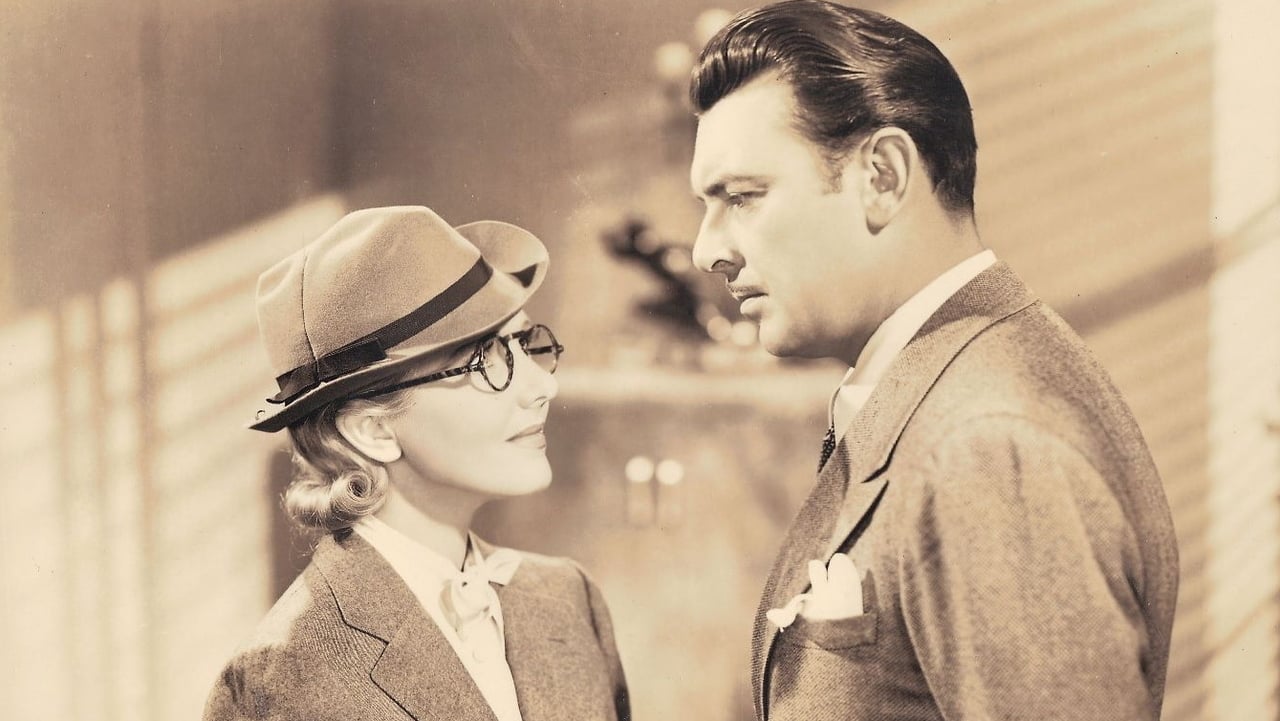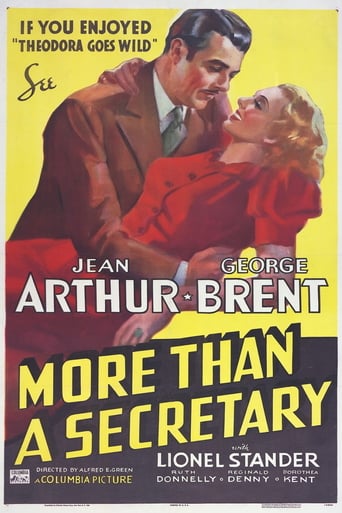

Don't attack your machines. The "typewriter is an instrument, not a man." So says secretarial instructor Jean Arthur. She ends up working as a secretary herself when she arrives at fitness magazine editor George Brent's office, turning the magazine upside down and predictably falling for the son of a brute. He's not really likable here, and Arthur gives the lesson to him that women can be of enormous help if given half the chance. Given a bit of an early feminist stance, this is a bit of a misfire because it tries to put a new twist on an old plot but doesn't come off as truthful. With Ruth Donnelly and Lionel Stander as confidantes to Arthur and Brent, it manages to be the supporting characters who steal the scenes. Dorothea Kent plays a stereotypical dumb blonde from Arthur's school who succeeds at two things: turning married man's heads and causing trouble for the leading lady. She has an element of crafty bitchiness that isn't found in most of these types of characters.Arthur and Brent could have been a much better match had they had a better catch. Made around the same to be as the glossier MGM drama "Wife vs. Secretary", this one is no match when compared to Gable, Harlow and Loy. It is standard stuff with substandard writing.
... View MoreAny industry with an accelerated worker shelf life (which includes sales, pro sports, and certainly show business) is ripe for serving as a prime example of what corporations do to 90 per cent of Americans (i.e., the working class): look for pretty faces, then chew them up and spit them out. Set in the context of the fictitious "Body and Brain" health magazine editorial offices, MORE THAN A SECRETARY would have been slightly more plausible in a moving pictures studio (but THAT would have struck Columbia Pictures too close to home).All the secretaries portrayed in this film, other than elderly spinster Helen (of undisclosed sexual orientation, though she jumps at the chance for an intimate two-girl camping trip with her roommate, Carol) blatantly state they are only jumping into the secretarial pool with an eye toward matrimony (i.e., giving themselves to the boss, body and soul). Some try to learn typing and spelling; others conclude, "Why bother?" As a harder, more educated, and more intelligent worker than her corporate boss Fred, Carol rights his Body & Brain sinking ship virtually overnight with her working class common sense. Fred's reward to Carol? He finagles a way to get her out of his sight completely while dumping ALL of his remaining work load in her lap. What's left in good ol' Fred's lap? It's not hard to imagine, seeing him weak in bed after drunken all-nighters with Carol's replacement in the private secretary slot, mercenary no-talent total airhead Maizie, Carol's secretarial school flunk-out from the movie's prologue. The film hammers home its didactic moral by showing that the richer and more powerful a corporate goon, the bigger a fool: Maizie lets go of Fred only to get her hooks into a much bigger fish, Fred's boss, magazine mogul Mr. Crosby. (If regular grade school math teachers ran Wall Street, instead of 12th generation Mayflower descendant Ivy League frat boys, the U.S. would have been spared the trauma of both this movie's Great Depression and today's Great Recession).To summarize, MORE THAN A SECRETARY's message is that the wealthiest 10% of Americans hide behind corporate shenanigans in what is still predominantly a good ol' boy's club, enslaving the remaining 90% of us to do all the useful work as long as we're youthful, and preferably pretty.
... View MoreThis film is a good example of the actors and their personas being MUCH better than the material they are given! While I have always loved Jean Arthur as well as George Brent in films, they are much too good for this tripe. In particular, Jean tries very hard in this film, but Brent's character is so poorly written and stupid that it drags the entire film to a standstill and looks as if it were written by some inexperienced hacks.The film begins with Jean and Ruth Donnelly at a secretarial school they own. So far, so good--both are wonderful actresses and I had my hopes set VERY high since they were in the film. Then, 'Maizie' (Dorthea Kent) makes an appearance as a ditsy hussy and the film begins to slowly slide downward (she was a truly cardboard and annoying character). So I was THRILLED when the film moved from this school to the offices of a magazine editor played by Brent. Apparently, he was such a demanding boss that secretary after secretary from the school either quit or were fired and so Jean goes to give him a piece of her mind. Instead, she is smitten by him and takes the job herself.At this point, I was intrigued by the film. No major problems. However, when she came to work the next day, Brent's character was such a ridiculous and impossible to believe jerk that the film really began to spiral downward very quickly. Not only was he bombastic and a total health nut, but his having everyone do group exercises (like those done in many Japanese companies, by the way) was poorly executed. What person would order these exercises and then open the window and let all their many, many papers blow across the office and yet continue exercising?! Surely it would take hours to rearrange all the papers--why not stop for five seconds to close the window! This sort of extreme and stupid behavior continued from then on, such as when they went out to eat at a vegetarian restaurant, go for long, long walks in the middle of pouring rain and talk on and on and on (ad nauseum) about "right living and exercise". This was all supposed to be funny, but really came off poorly, as his character seemed more like a silly caricature of a person! Now if this wasn't bad enough, about midway through the film, Maizie re-appeared and then the film's romance between the leads was completely derailed. At this point, Brent ("Mr. Extreme") became such an obnoxious jerk that it was small wonder that Jean didn't just kill him! The bottom line is that it must have taken a lot of work to but Brent and Arthur in a film and have me so bored and annoyed by the whole thing. Considering all the warm and wonderful films these two made, it's amazing that this film was as poor as it was.
... View MoreJean Arthur is a secretarial teacher who becomes "More Than a Secretary," a 1936 comedy also starring George Brent, Lionel Stander, Ruth Donnelly, Reginald Denny and Dorothea Kent. Arthur and Donnelly run a secretarial school for dizzy young women who plan on using their skills to nab husbands in corporate America. One gal in particular, Maizie (Kent) is a total dropout but seems to have the man magnet technique down, to the disgust of the bespectacled Carol, who hasn't given up on love. When a client fires another secretary, Carol decides to replace her and goes to work for a health magazine run by Fred Gilbert (Brent). Carol falls for him...and then complications arise in the form of the aforementioned Maizie.This is a very dated, slow, and ultimately boring comedy that fails to hold interest. Brent is actually quite good as a passionate health nut. Comedy is a departure for him, and he's successful at it. Arthur is very good, but it's not a role with the type of range one is used to seeing her do. And it's hard to get past the extremely dated notion of women going to work only to meet men and then quitting their jobs, their goal accomplished. But the typewriters are a hoot as are the phrases being dictated. If you're old enough to remember Peter Piper picked a peck etc., standard manual typewriters and manual returns, you'll have a good laugh.
... View More